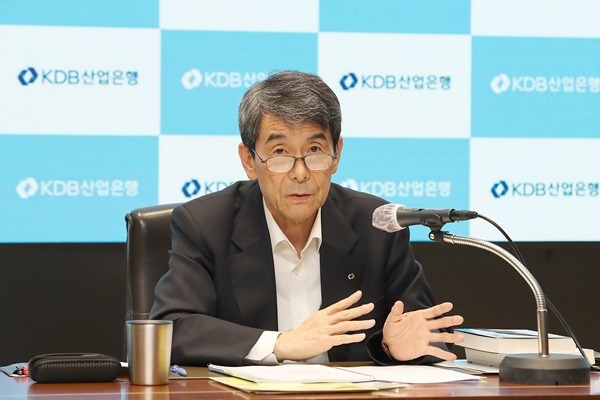 |
KDB Chairman Lee Dong-gull (Korea Development Bank) |
The head of the state-run Korea Development Bank on Thursday expressed “strong regret” over the European Union antitrust regulator’s recent decision to block the merger of two Korean shipbuilders, saying that the move undermined Korea’s long-term efforts to normalize the shipbuilding industry.
“I apologize and must express strong regret over the EU’s recent decision to veto Hyundai Heavy Industries Group’s proposed acquisition of Daewoo Shipbuilding & Marine Engineering,” KDB Chairman Lee Dong-gull said at the bank’s New Year’s briefing held online. KDB is the main creditor of the heavily indebted Daewoo Shipbuilding.
“The move has disappointed the efforts of Korean creditors and I would support Hyundai Heavy if it chooses to file a lawsuit against the European Commission,” he added. The European Commission is the EU’s politically independent executive arm.
A Hyundai Heavy lawsuit could be a way to prove that Korea won’t be swayed by a foreign regulator’s decision, the KDB chief explained.
With the option of Hyundai Heavy’s acquisition off the table, Lee said that the KDB would plan the next move regarding Daewoo Shipbuilding based on the results of a review by external experts set to wrap up in March.
“Even if the merger may not be a plausible option, our prolonged control over Daewoo Shipbuilding is inappropriate and could hinder the growth of the nation’s shipbuilding industry,” Lee said.
“We must review other potential bidders and the situation surrounding the market,” he added.
The KDB chief said that the bank is open to all options concerning M&A, but ruled out overseas acquisitions of Daewoo Shipbuilding.
Lee’s disappointment follows the European Commission’s announcement on Jan. 13 to veto the merger, saying such a move could create a monopoly in the liquefied natural gas carrier market. The merged company’s market share in the LNG carrier market would add up to at least 60 percent, it explained.
Lee also criticized the Commission’s decision, saying the merger was blocked on concerns it could lead to higher gas prices for EU citizens.
In March 2019, KDB agreed to provide the 56 percent stake it holds in Daewoo Shipbuilding to Hyundai Heavy in exchange for a stake worth 1.25 trillion won ($1 billion) in Korea Shipbuilding & Offshore Engineering Co.
Under the initial agreement, Hyundai Heavy was planning to raise 1.25 trillion won through the sale of Daewoo Shipbuilding shares to pay back Daewoo’s debts after acquisition.
On Edison Motors’ planned buyout of SsangYong Motor, Lee also expressed skepticism over the takeover of the local electric truck manufacturer in what he called the “worst” form of an M&A.
Whether KDB will extend loans to Edison would be solely decided on its debt repayment plan, with SsangYong’s rehabilitation to be submitted by March 1 under the court-led sale procedure. On Jan. 10, a Seoul court approved the acquisition of SsangYong Motor by a local consortium led by Edison.
“But it seems Edison’s acquisition of SsangYong is a typical leveraged buyout which is the worst form of M&A,” Lee said. A leveraged buyout, more widely known as LBO, is the acquisition of another firm using a significant amount of borrowed money in forms of bonds or loans.
Besides the botched merger between the two shipbuilders and planned acquisition of SsangYong, Lee addressed KDB’s key goals in terms of overseas expansion and green financing for this year.
“We plan to launch a European desk headquartered in our London branch, similar to the venture capital subsidiary we launched in US’ Silicon Valley, last year,” he said.
“In terms of green financing, we plan to set up a verification system to find out what type of financing businesses need in order to achieve net-zero goals.”
(
mkjung@heraldcorp.com)






![[Herald Interview] 'Trump will use tariffs as first line of defense for American manufacturing'](http://res.heraldm.com/phpwas/restmb_idxmake.php?idx=644&simg=/content/image/2024/11/26/20241126050017_0.jpg)
![[Exclusive] Hyundai Mobis eyes closer ties with BYD](http://res.heraldm.com/phpwas/restmb_idxmake.php?idx=644&simg=/content/image/2024/11/25/20241125050044_0.jpg)
